WhatsApp is, as you know, everyone’s favorite messaging platform. It has also become a valuable tool for businesses to connect with their customers. As per data from WhatsApp, people send over 100 billion messages via this network every day.
Hence, WhatsApp marketing has become a turbocharged trend in the digital marketing realm. Every small or big, new or old brand is using WhatsApp marketing strategy to promote their products through improved customer experience and increased brand trust and loyalty.
But now, you must be thinking about how to do this by seamlessly interacting with customers. The simple answer to this is through integrating a WhatsApp chatbot, which helps to enhance interactions with your customers and contribute to business growth.
WhatsApp chatbots are automation that helps to improve efficiency. They offer 24/7 customer support, with one-to-one interactions to customer queries, leading to enhanced customer satisfaction and business growth.
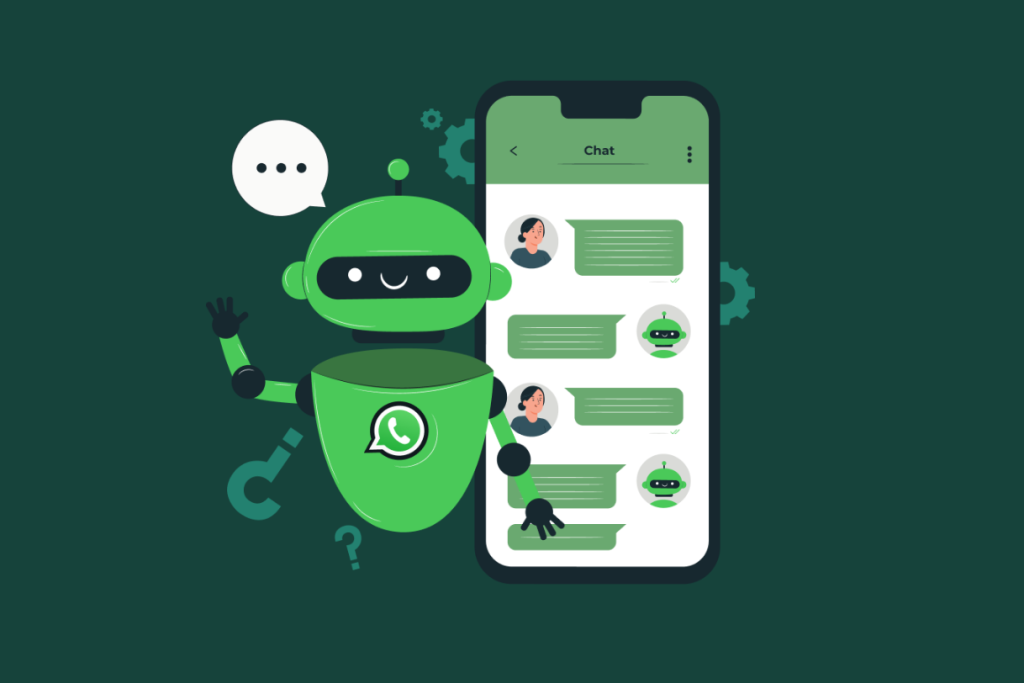
So, let us start by learning more about WhatsApp chatbots.
What is A WhatsApp Chatbot?
A WhatsApp chatbot is similar to a Live Chat, an automation programmed by data and artificial intelligence. It is a personal assistant on WhatsApp that has the ability to handle all conversations without the need for a real person, ensuring the customers are never unheard. It is such an integrated program that it is widely used around the globe nowadays.
With chatbots, tasks are easily automated, bridging the gap between customers and businesses. Chatbots can also keep the tone consistent with brand identity during the conversation.
Say, for example, you are in an e-commerce business, and the customers are raising different queries, like “What’s your store’s address?” or “What time do you open? And in this case, if you have a super-intelligent chatbot, it will quickly reply to your customers. Chatbots are friendly robots that address all your customer queries.
How do WhatsApp Chatbots work?
WhatsApp chatbots work just like our brains. They are made according to the business’s requirements and the services being delivered. Generally, 2 categories of chatbots are being used.
1. Rule-based chatbots
A rule-based bot has a limited range of comprehension with a predefined set of programmed conversations.
2. AI-based chatbots
This bot is programmed with artificial intelligence and trained using machine-learning algorithms. It can understand open-ended queries. This is being widely used since the AI chatbot identifies the language, context, and intent, which then reacts accordingly.
Why Business Needs WhatsApp Chatbot?
Now, let us quickly understand the benefits of having these smart chatbots for the business.
1. Elevate Customer Support
With the chatbot, you can address any concerns or queries of your customers. This helps to streamline the process of customer support service 24/7 and provide instant responses, and the customers are never unheard. Irrespective of time zones or work hours, the customers are addressed, improving customer satisfaction and brand loyalty.
2. Automate Responses
Nevertheless, one of the standout features of using a bot for Business is its capability to provide the most accurate replies to queries. When used with WhatsApp Business API integration, chatbots offer immediate solutions.
3. Enhancing Engagement
WhatsApp chatbots are friendly robots that provide your customers with interactive engagement, giving a feel of more conversation than transactional. This approach helps to enhance the overall customer experience, ensuring that your business never sleeps and reaffirming your commitment to their needs.
4. Easy accessibility
WhatsApp is a powerful tool in today’s digital landscape, with more than a billion users. An intuitive platform, WhatsApp chatbots help bridge the gap between customers and businesses.
5. Enhancing sales and marketing opportunities
A message with WhatsApp is really hard to ignore compared to other outreach platforms. When you launch a campaign for a new product, sales-related information, or product updates, chatbots help front and center, boosting overall sales and business growth.
6. Personalized Experiences for Users
WhatsApp chatbots are primarily AI-driven, which helps deliver services to the customer by understanding their preferences, purchase history, and even past interactions. These chatbots make customers feel valued, offering customized recommendations that lead to happy customers.
7. Trustworthy & secure
WhatsApp is committed to end-to-end encryption and two-factor authentication. Hence, these chatbots ensure that your customers’ data remains protected, safeguarding sensitive information that has been shared.
By now, it is evident that WhatsApp chatbots streamline processes and empower business growth. In the coming section, we will delve into the ways to get WhatsApp chatbot solutions.
WhatsApp Chatbot Solutions- 2 Ways
There are basically two ways by which you can avail the super intelligent chatbot service through WhatsApp:
| Features | Business App | API Account |
| Designed for | Small business | Medium to large |
| Automated Replies | Limited | Multiple |
| Cost | Free | Not Free |
| Broadcast | Limited to 256 recipient | Send to 100000 users in one go |
| Notification | No | Yes |
| Chatbot | No | Yes |
| No of Devices | 5 | Multiple |
| Contact Sync | Phone | CRM Tools |
| Integration | No | Yes |
To understand how to use Chatbots for your business, WhatsApp Business is a good option if you are a budding company that needs simple automated messages, including away messages.
However, WhatsApp Business API is for large brands (enterprise-level) that need a complete business suite that integrates seamlessly with their other digital channels and data. It has a higher level of customization.
However, if you plan to create an intelligent chatbot and receive many messages daily, the WhatsApp Business Platform through API is the best option because it offers customization and greater flexibility.
Remember that the usual WhatsApp Business App isn’t chatbot-friendly; you’ll need to tap into the WhatsApp Business API to make this magic happen.
With a WhatsApp Business App, there are no chatbots; instead, you have 2 options to choose from: Away Message and Automatic Reply. For chatbot integration, one needs a WhatsApp API account.
The WhatsApp API is essential for implementing a WhatsApp chatbot. Let’s explore the steps to access it.
Minimum Requirements for a WhatsApp Business API
To integrate a Whatsapp chatbot to streamline tasks, let us quickly discuss the minimum requirement of having a WhatsApp Business API account.
- A Meta Business Account and a WhatsApp Business Account are linked to it.
- A Business Website and a Business email ID.
- A new phone number that is not linked with any WhatsApp account.
Please note: There are 2 Ways to obtain a WhatsApp Business API.
- Meta: WhatsApp API can be directly obtained from Meta. It also provides a cloud service API that enables businesses to build on WhatsApp, connect with clients faster, and personalize their experience. However, you must abide by a few Terms and Conditions, and there are quite a few limitations, especially with their customer support.
- Business Service Providers (BSPs): You can also choose a BSP to help you set up and get started with your WhatsApp API. BSPs act as intermediates that allow you to start from scratch and obtain an API.
Steps to Build WhatsApp Chatbots
1. Setting a WhatsApp Business Profile
In the above section, we already discussed the importance of creating a WhatsApp Business profile for integrating chatbots into API. A WhatsApp Business profile includes the following information.
- Name
- Photo
- Phone number
- Short description
- Category
- Business hours
- Email address
- Website
How to Set It Up: It can be easily downloaded from Google Play or the App Store. Fill out all your details, verify your business phone number, and provide essential business information. This is the foundation stone for your WhatsApp Chatbot.
2. Choose a Chatbot Platform
There are many chatbot platforms available online that help with the seamless integration of chatbots into your WhatsApp. SendWo can be a great choice here since it offers Chatbots along with many other WhatsApp marketing solutions. It has a user-friendly design with unparalleled customer support.
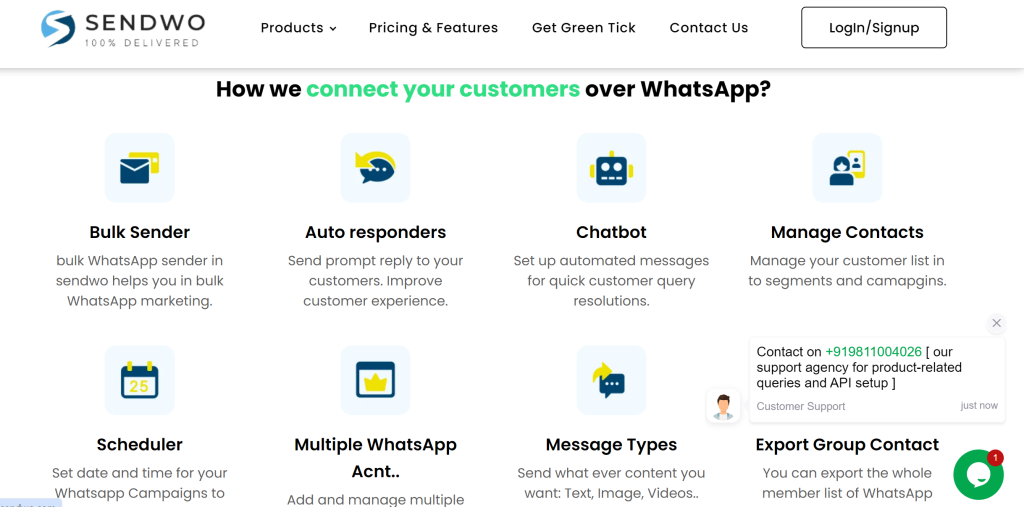
3. Design Your Chatbot’s Flow
To design the Chatbot flow, the essential elementary step to begin with is to understand the user intent. This approach helps you create more precise and customized replies for your customers. With proper anticipation the Chatbot platform you chose will respond to the queries more promptly and efficiently.
4. Test Your WhatsApp Chatbot
Deploy your chatbot with rigorous tests. Go with trial runs. Test all the functionalities. Address all the glitches that occur during the testing period and reconstruct for a smooth launch.
4. Launch and Promote Your WhatsApp Chatbot
Once the outflow has been created and tested with real-world simulations, introduce the chatbots to your customer base, including both new and old ones, through different marketing campaigns and maximize the visibility.
Types of Businesses Leveraging WhatsApp Chatbots
Businesses heavily use chatbots to enhance customer experiences, streamline operations, and drive engagement. Let’s delve into various industries that have successfully empowered the business quotient. A few examples have been elucidated:
1. E-commerce
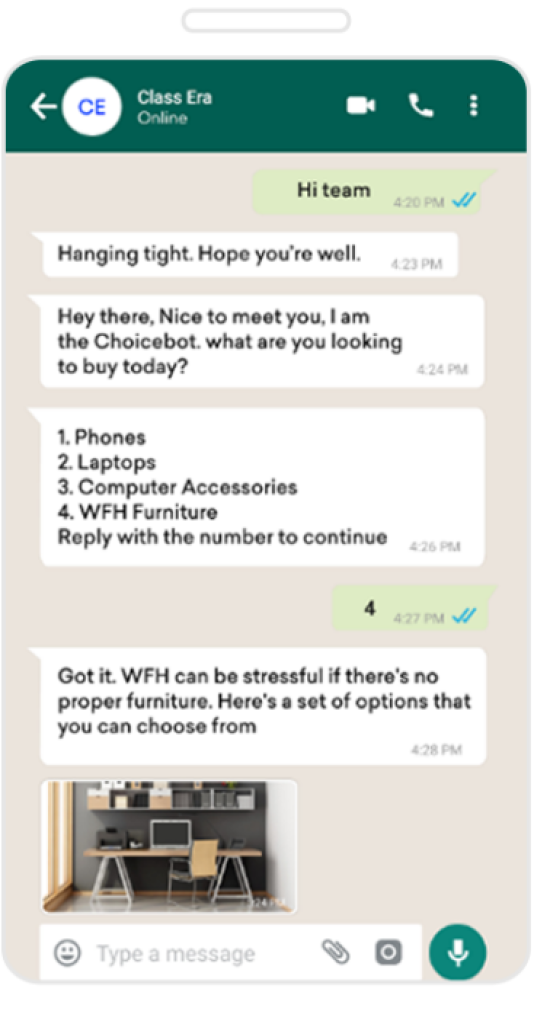
WhatsApp Chatbots have completely revolutionized the e-commerce landscape. Some of the best practices employed here to create interactive customer engagement include product inquiries and recommendations, order tracking, and returns. Chatbots also help provide real-time updates on order status, the address to return, and feedback.
2. Banking
The next sector on the list is the banking sector. Chatbots are deployed in this sector since they help provide account balances to users. Transaction history, transaction alerts, and fund transfer notifications are also made through WhatsApp Chatbots. These are also used to streamline onboarding and service access with quick customer support.
Hence, bots play a crucial and multifaceted role in enhancing the banking sector by enhancing the overall user experience.
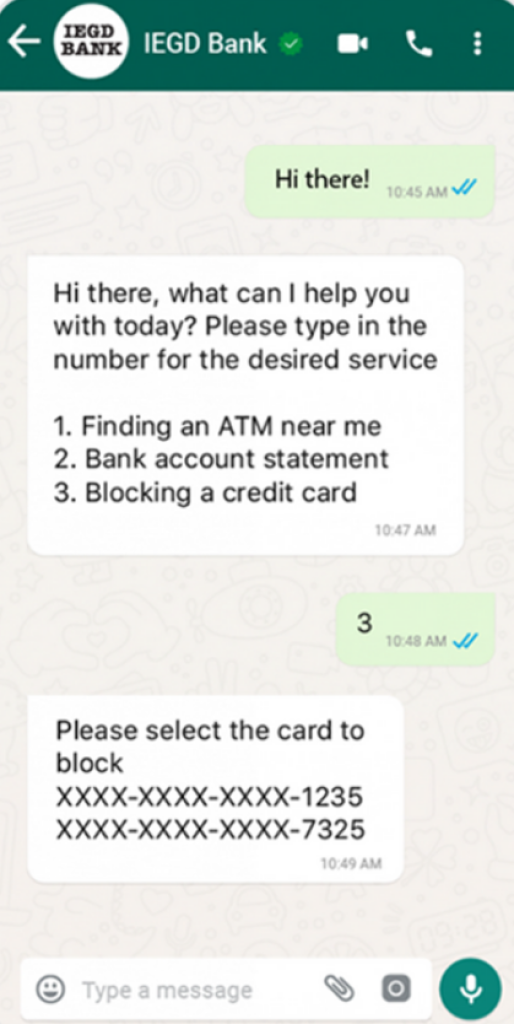
3. Healthcare
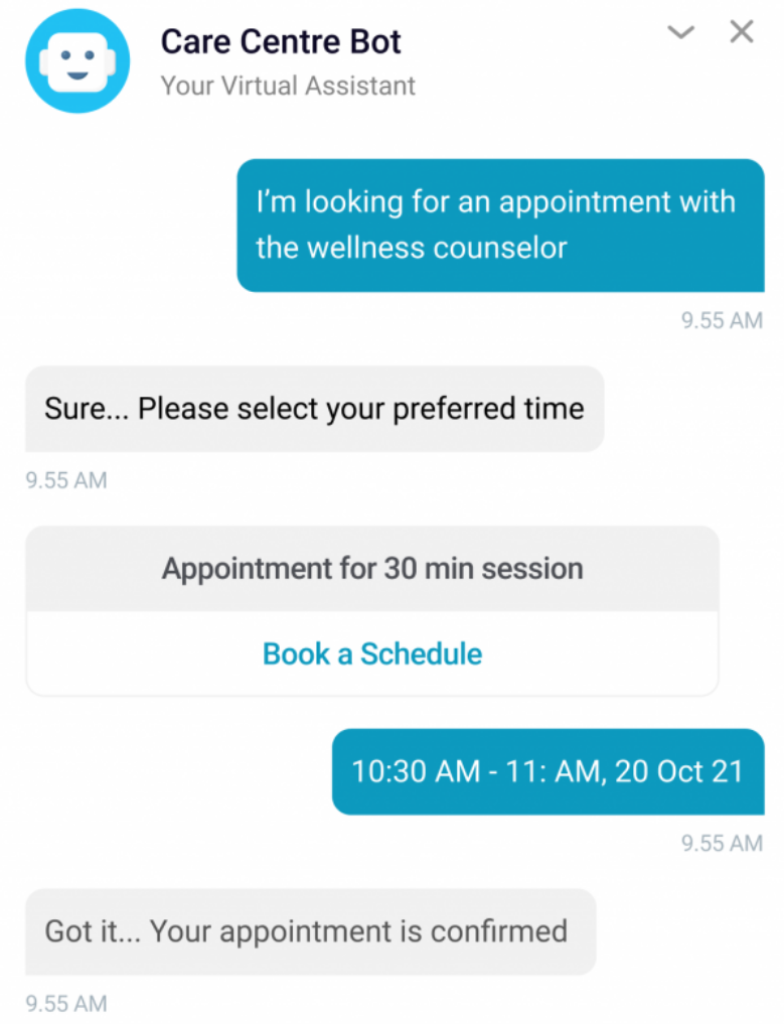
In the healthcare sector, the WhatsApp chatbot enables the user to schedule appointments and track medical records. These chatbots also send automated reminders to users.
4. Retail
In the retail field, too, chatbots are game-changer tools. They not only allow customers to place orders but also help them explore customized shopping lists based on their preferences and previous shopping history. This enhances the customers’ shopping experience and indeed builds customer loyalty.
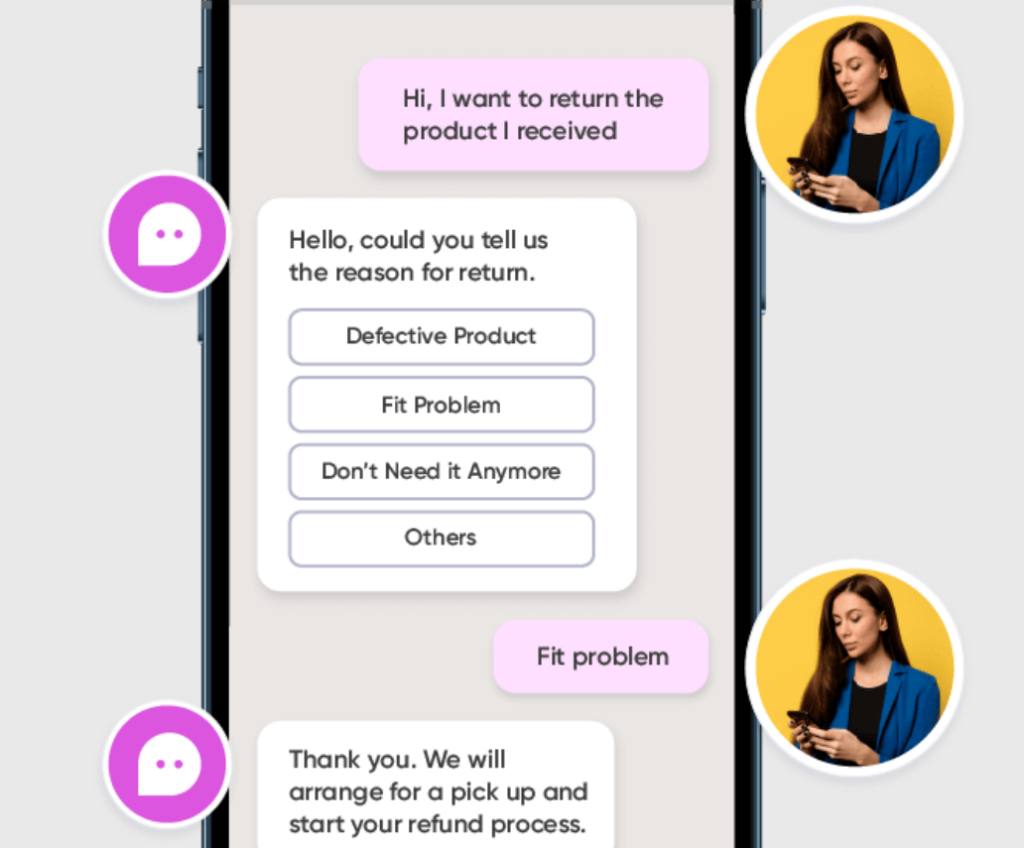
These are a few examples of businesses that have effectively integrated WhatsApp chatbots into their operations to streamline all related tasks, enhance customer experiences, and provide 24/7 customer support for their users’ needs.
Final Words
Undoubtedly, WhatsApp chatbots hold an exciting possibility of reshaping businesses’ interface with customers and streamlining operations. With a multi-channel integration of the chatbots powered by AI technology, chatbots seamlessly communicate across platforms, making conversations more engaging and intuitive. This will create personalized and tailored responses based on users’ preferences.
It is evident that these bots through WhatsApp will empower businesses to create a hyper-personalized interface for users, with AI-powered conversations that are more engaging and customer-centric.








